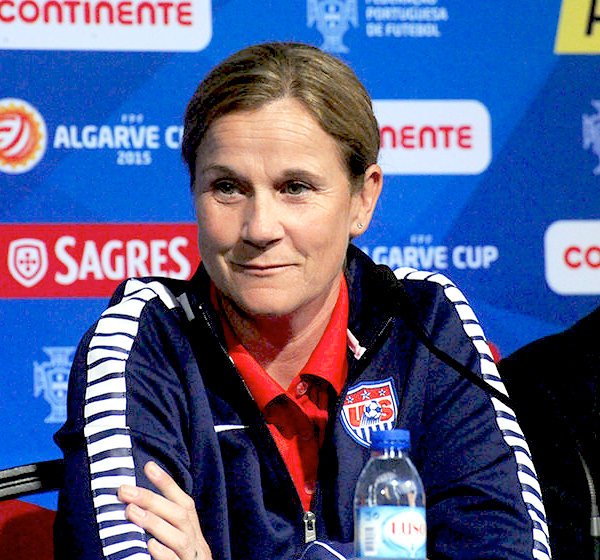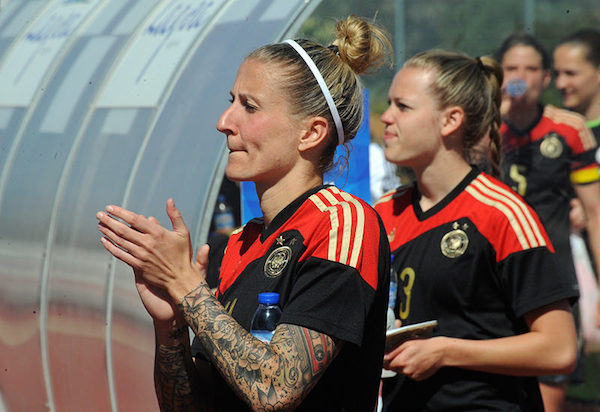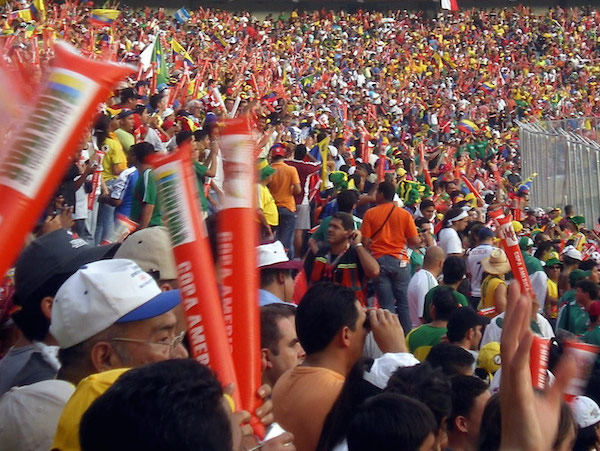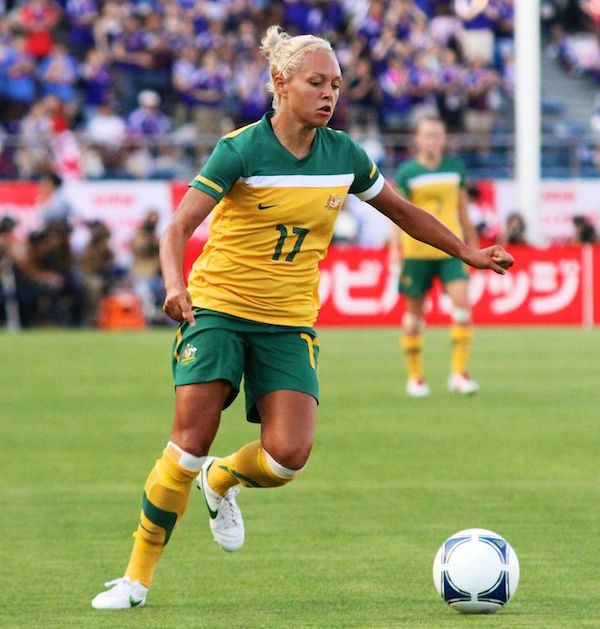Tuesday night at 7 p.m. ET, the United States women’s national soccer team will play against Germany in the semifinals of the World Cup. The game will be televised on Fox but I will not be watching. I’ll be at the game, wearing a U.S. jersey and screaming a lot. I am about as excited and nervous and full of dread as I can remember being the night before a sporting event. To prepare for the event, I’ve written a lot about the game. In this post, I preview the game’s plot and important characters. I also wrote about dreading our opponent and why I won’t be taking part in the “I believe that we will win” chant.
The Stakes
Despite being a semifinal, this game feels like the most important game of the tournament. Some of this is perception. Coaches (and the athletes they drill their messages into) are fond of saying that today’s game is always the most important game and it’s possible that fans have internalized that to some degree. Today’s game is the most important game just like last game was the most important game before it happened. There is some quantifiable truth to the feeling also. Germany is the top ranked team in the world and the United States is second. No matter who the winner of this game faces in the finals, they will not be ranked as highly as their opponent today. It certainly feels like the winner of this game is a lock to win the World Cup. According to Five Thirty Eight’s predictive model for the tournament, that’s more or less true. They predict that the winner of this game will win the tournament 73% of the time. 27% is not zero though and you can be sure that if the United States wins this game, the final on Sunday will suddenly feel like the most important game of the tournament. That’s sports, I guess.
The Plot
Until the quarterfinals, the plot of this game would have been simple. The German team had looked very much like a well-oiled, virtually unbeatable machine, while the United States team had sputtered and stuttered and played just barely well enough to get by. The plot would have been, from the American perspective, a story about the tragic inevitability of a team with so much promise but which was unable to find the tactics or the confidence or the je ne sais quoi to transform them into a championship team. We would have fully expected the United States to lose the first time they played a truly world class opponent like Germany. Thanks to the results of the quarterfinals, people now feel differently about this game. The question is, to what extent and how correct are we?
In their quarterfinal matchup, the German team was convincingly outplayed by the French. The French team attacked from the moment the game started and never took the pressure off throughout the whole 120 minutes the game eventually took. Pressed by the French, the German defense looked mortal and their offense, except for during 15 minutes of the second half, was not able to connect with each other to make the kind of decisive attacks we are used to seeing from them. The French team were more skilled and held up physically to the German side. Only penalty kick prowess/luck (penalty kicks are such a crap-shoot that it’s always hard to tell whether they are skill or luck, although in men’s soccer, some nations, including Germany, have been shown to be better over decades than others) allowed the Germans to beat the French, first one on an unfortunate unintentional hand-ball in the box during regulation time and then five straight makes in the shootout. The way the French dominated the Germans allows us to go back and revise how we think about this German team. Instead of an unstoppable juggernaut, we can round down the Germans to a very fast moving car.
The quarterfinals were a watershed moment in the way people perceive the American team as well. Their game against China was the first time we saw the United States look confident and aggressive. Soccer reporter extraordinaire, Grant Wahl, quoted midfielder Carli Lloyd as saying that the game was the “first time we collectively put a team on its back heels in this World Cup.” This could not be more true. We may never know the reason for the team’s transformation but we do have a couple good working theories.
One theory suggests simply that China was the weakest team the United States had faced so far in this tournament. This isn’t true by ranking, both Colombia and Nigeria are ranked far below China, but rankings don’t always tell the whole story. Proponents of this theory claim that China’s weaknesses (a tendency to ignore the flanks when they attack and a dearth of players with notable pace and physicality) played right into the United States’ strengths, allowing us to look so good. The corollary to the China-is-bad theory is that against Germany, the United States will go right back to looking and playing poorly. Boo! I do not like this theory.
Let’s move on to the second main theory: roster changes. Due to suspensions to Lauren Holiday and Megan Rapinoe, coach Jill Ellis was forced to change her lineup for the quarterfinals. She decided to shuffle things up even more than that and the second theory claims that this was the reason for the team’s strong performance. Holiday and Rapinoe are both playmaking offensive midfielders. They love to have the ball at their feet so they can jumpstart an attack with a perfectly targeted pass. You know who else likes to have the ball at their feet? Carli Lloyd, Tobin Heath, and Christen Press, the other three midfielders who had played during the Group Stage. That’s a lot of players in the midfield, all wanting the ball, and all focused on attacking. When any four of those five players are in the midfield together, the tactical dynamic seems to be out of whack. Everyone wants the ball, everyone wants to attack, but because there’s no obvious defensive anchor, everyone feels a little bit like they shouldn’t go forward. As a result, everyone (at least in the center of the midfield) hangs back a little where they generally get in each other’s way. Through the group stage, the midfield had looked uncomfortable and ineffective. Without Rapinoe and Holiday, Coach Ellis subbed in Morgan Brian and Kelley O’Hara. Although she too prefers playing offensively, Brian is more proficient at playing as a purely defensive or holding central midfielder. O’Hara is less of a playmaker and more of a physical dynamo. She gets up and down the field, putting pressure on her opponents, and looking to score, without actually needing a lion’s share of the ball to be effective. For the fourth midfielder, Ellis had a choice between Heath and Press. The fact that she went with Heath, a player who, although she likes to have the ball at her feet, actually prefers to play on the wing, as opposed to Press, who if she had her druthers would be in the center of the field, makes Ellis’ intent clear. Through her choice of midfielders, Ellis freed up Carli Lloyd to play in her preferred position, as an attacking central midfielder, and effectively unclogged that part of the field to allow her to operate with competition from her teammates. If Ellis had only made those changes, that might have been enough, but she made one other big change. She sat Abby Wambach and replaced her with Amy Rodriguez. Wambach, as you probably know, is the greatest international goalscorer of all time. However, she’s 35 years old now, and as much as her fans, myself included, hate to admit it, she’s slowing down. Despite her decline, Wambach is still an amazingly magnetic player. When she’s on the field, her teammates seem to look to feed her the ball at all costs. This hasn’t worked very much during this tournament. By removing her from the starting lineup, Ellis forced the other team to find other ways to score. By replacing her with Rodriguez, Ellis set the tone for a gameplan that included pressuring (sometimes called “pressing”) the other team whenever they had the ball, even on their own side of the field.
The dilemma of being Jill Ellis
More than any other single person, this game is all about United States coach, Jill Ellis. She’s got some tough decisions to make. After the success of her lineup changes in the quarterfinals, it would seem like a good idea to put a similar lineup with a similar strategy out there for this game. There are two problems with that idea.
The first is simply a question of will and guts. Ellis was forced to make linuep changes last game because two of her star players were suspended. Will she have the guts to sit those players in this game, when both are available to play? Sitting Rapinoe and Holiday was a necessity in the quarterfinals but it would be a controversy in the semifinals. Every time a coach does something unconventional, she draws more focus to her and risks more of her reputation on the outcome of the game. Sitting Abby Wambach for most of the quarterfinals worked out okay but it was a much more comfortable decision against a Chinese team that the United States should have beaten almost regardless of what our starting lineup was. Against Germany, in a game that will decide the fate of this team’s World Cup dreams, dreams that are very much focused on “getting Abby” a World Cup championship before she retires, the choice to sit Wambach will be a much less comfortable decision.
Complicating matters is the sneaking suspicion that what worked against the Chinese may not work against the Germans. Not that Ellis has anyone to blame but herself for this, but this United States team doesn’t really have a natural defensive midfielder and Morgan Brian, although she provided a wonderful facsimile of one against China, may not be physical enough to do it against a larger and stronger German team. Playing Amy Rodriguez and Alex Morgan up top and asking them to make the defense uncomfortable handling the ball worked against an inexperienced Chinese defense but may not against a veteran German group.
The soccer world awaits Jill Ellis. What will she do?
Who is going to win?
Germany. Germany is going to win. I feel it in my bones and it feels like I’m an arthritic 75 year-old and there’s the storm of a century coming. Despite now knowing that in reality, Germany doesn’t always beat the United States, they still feels like an insurmountable opponent. After traveling thousands of miles to see the United States men’s ice hockey team in the 2014 Olympics, only to watch them lose 1-0 to Canada, I fear the same thing will happen in this game. I fear that Germany will score an early goal and I, along with tens of thousands of other U.S. fans at the game and millions around the country will never get a chance to really cheer for our team. I know that much of this, maybe even all of it, is illogical. These are two relatively even teams and despite Germany being a slight favorite, there’s really no telling what will happen. It’s just as likely that the United States will score an early goal or that no one will score any goals at all. I know this, I just don’t feel it. Part of the way I root for teams is by internalizing my desire for them to win as a series of foreboding and pessimistic emotions. It’s just how I root — don’t listen to me — go U.S.A!









